Workers at Amazon are rising up against the brutal conditions imposed on them by their parasitic boss, Jeff Bezos.
The owner and founder of Amazon, Jeff Bezos, has recently become the richest person in the world. His estimated wealth now stands at an eye-watering $150 billion.
It is no coincidence that his company viciously suppresses their workers from unionising and regularly subjects them to inhumane working conditions.
Amazon warehouses all over the world are notorious for their brutal treatment: zero-hours contracts and unreasonable hours; spy-cameras on the shop-floor to stop any breaks; brutal working quotas; and sweltering temperatures in the warehouses. In the UK alone, ambulances have been called out to these warehouses over 600 times in three years as these conditions take their toll on people.
Finally, enough is enough for some Amazon workers, with staff in Spain taking a stand against these insufferable conditions.
A group calling itself Amazon En Lucha (Amazon in struggle) organised a three-day walkout last month (on 16-18 July) at the company’s distribution centre just outside of Madrid. The workers on the picket stood outside wearing Jeff Bezos masks to mock the fact that the richest person in the world can’t afford to give his workers decent conditions.
The strikers released a statement claiming: “We in Madrid believe that only if we struggle together will we gain recognition for our demands.”
Their grievances include ever-increasing working hours, the elimination of bonuses, and a lack of protection against illnesses.
The Spanish workers called for all Amazon workers around Europe to go on strike to disrupt the launch of ‘Amazon Prime Day’ (16 July), their biggest sale day in the year.
“Similarly, only with a joint action at a European level will workers organise in those places where there is no union representation yet.”
Fisacat, a trade union in Italy, threw its support behind the Spanish workers. This, in turn, inspired more walkouts in Poland and Germany.
It’s not clear how many Amazon workers across Europe were involved but it is believed to be in the thousands. Amazon repeatedly denies bad treatment of their workers and refuses to negotiate with strikers. But, whether they admit it or not, the radicalisation that is taking place at these warehouses will only increase in the future.
The negative press that was generated about Amazon from these strike actions prompted the hashtags #amazonstrike and #amazonboycott where sympathisers boycotted the prime day promotions in order to hurt the companies profits.
Although no specific demands have been met from these strikes so far, the workers have not been defeated and can clearly see the power and necessity of large-scale international industrial action.
The last waves of strikes were not the first to take place at Amazon – and they certainly won’t be the last. Unlike Jeff Bezos, those of us who aren’t making $230,000 a minute will need to fight and struggle for higher wages and fair treatment. Seeing the stark divide between the enormous wealth of the CEO and the suffering of the workers has a radicalising effect – and that sentiment is only going to become more and more pronounced.
As Marx noted in his magnum opus Capital, the necessary result of capitalism is: “The accumulation of wealth at one pole means so simultaneously to the other pole accumulation of misery, of torture to the task, of slavery, ignorance, brutality and moral degradation…”
Amazon workers need to organise and fight and take control of the company that they have built. Only then can the working class benefit from the vast sums of wealth that their labour creates but which parasites like Bezos currently horde.






